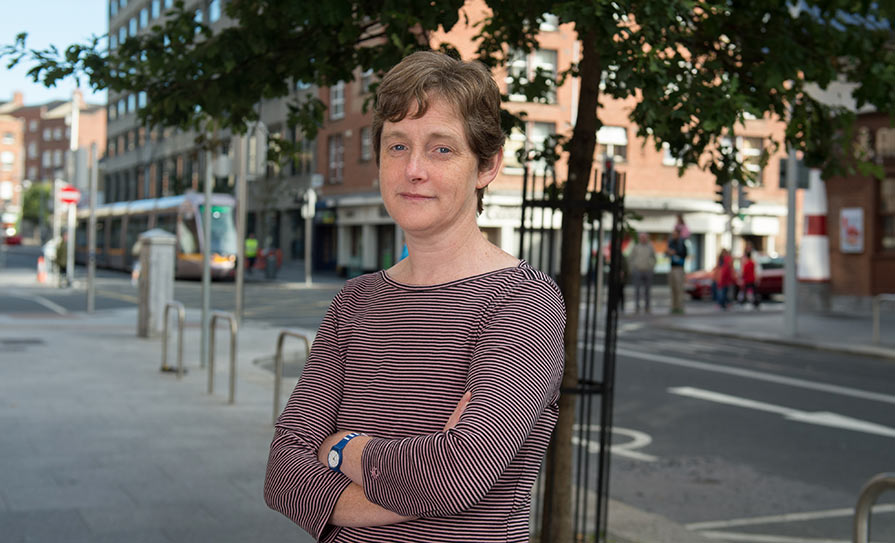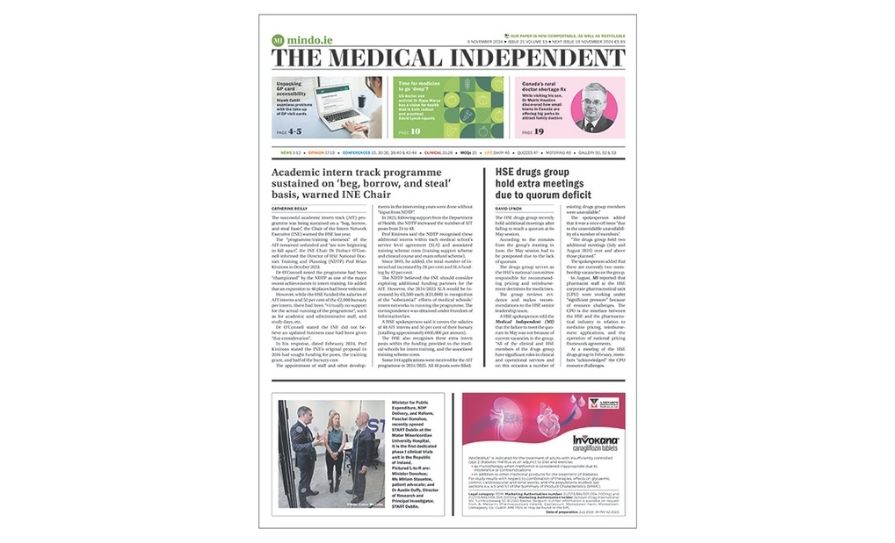With a national artificial intelligence (AI) strategy imminent and an increasing number of AI health projects underway in Ireland, David Lynch looks at recent trends in the area and what the future promises
The era when artificial intelligence (AI) was confined to the plot lines of sci-fi novels and movies has long since passed. Its use is established and expanding in a number of areas of medicine and the Government is due to publish its first national AI strategy in the coming weeks. However, the use of AI in health still provokes questions, particularly around ethics, law, effectiveness, and cost.
Dr Eric Topol, an American cardiologist and author of Deep Medicine: How Artificial Intelligence Can Make Healthcare Human Again told The New York Times in 2019 that the key areas where AI shows promise included “machine pattern
recognition to promote the rapid and accurate reading of medical scans, slides, skin lesions, the pickup of small polyps during colonoscopy”.
However, when asked where it is most likely to fail, he warned that “there’s no shortage of deep liabilities” for AI
in healthcare.
“The liabilities include breaches of privacy and security, hacking, the lack of explainability of most AI algorithms, the potential to worsen inequities, the embedded bias and ethical quandaries.”
Development of the use of AI is a key digital goal, Prof Martin Curley (PhD), HSE Director of the Digital Transformation and Open Innovation, told the AI Summit 2021.

The HSE had lifted its digital “maturity” level during the pandemic, he told the online conference attended by the Medical Independent (MI). He was speaking before the recent cyberattack on the HSE.
“Our ambition is to move Ireland from being a digital health laggard, to a digital health leader,” Prof Curley told delegates.
“We have made some progress during the Covid-19 pandemic; we estimate that we have lifted maturity level in the last year, but our ambition is to be a European leader by 2026.
“In general, healthcare is about a decade behind [other industries when it comes to AI]. What we are starting to see is a catch-up… we know we are a laggard in terms of technology, but we are hoping to accelerate. One of our key focus areas is the use of AI.”
Prof Curley admitted that Ireland is “quite a way behind some of the other OECD countries. But there is an opportunity for us to leapfrog, not just into the new digital health model, but to leapfrog into the application of AI.”
He said the HSE CEO and the Chair of the board are “increasingly” aware of the digital opportunities and “they see digital as an important tool in fighting Covid-19 and modernising” the broader health service. Prof Curley outlined how the influence of AI had spread from the everyday use of FitBits to the “huge untapped” area of drug discovery.
“In Ireland, we have to first go from automating our transactions to then going onto the ‘S curve’ of growth, which is [about] applying AI to a lot of clinical data that we will capture in the coming years.”
Prof Curley noted there is a particular focus of AI in radiology. “We also know there is a global issue around the supply of radiologists. But this is something that can be addressed quite soon using technology,” he told the AI Summit
Last year, Dr Toni Anderson, Radiology SpR in Tallaght University Hospital, co-authored a paper in the Irish Medical Journal titled ‘The impact of the introduction of AI to Ireland.’ The paper noted that “based on the literature… not many foresee the imminent replacement of radiologists by AI”.
Radiologists will remain a central crucial cog in the diagnostic process of image-based medicine, with AI acting as a “cognitive companion”.
“There is no doubt that in medicine there is a huge reliance on imaging for making diagnoses, and as such, radiologists are getting busier and busier,” Dr Anderson told MI. “There is definitely a lot of scope for AI in radiology. However, from what I’ve seen to date in our specialty, AI is not foolproof and makes errors and misinterpretations.”
Dr Anderson said the technology “currently needs the eyes of a doctor to oversee it and either concur with its findings or disagree”.
“The human body is so complex, there are innumerable anatomic variations that make every person different and knowing the patient’s previous medical history hugely impacts on the interpretation of a medical image.
“Technology is, however, obviously getting exponentially better as we have seen in other industries.”
She said there is little doubt “that it will continue to grow and augment radiology interpretation in the future. It will undoubtedly make reporting more robust and help to reduce errors.”
“It could also help in speeding up time-consuming tasks, such as following up and measuring designated multi-focal metastases in malignancy, with the ability to make multiple measurements in the fraction of the time manual measurements may take.
“Radiologists would embrace such a helpful tool,” said Dr Anderson.
This summer marks a significant moment in the history of AI in Ireland. During his presentation to the Summit, Prof Curley said the Irish health service has “come out of the AI winter”. He added that Ireland is in the very early stages of the deployment of AI, “but we think the opportunities are really immense” and the next decade will see “huge changes and benefits for patients in the use of AI in healthcare”.
These changes will at least in part be directed by a new Government policy that will be unveiled in the coming weeks.
The draft national AI strategy is currently being finalised and “is expected to be published before the end of June”, a spokesperson for the Department of Enterprise, Trade, and Employment told this newspaper. The public consultation process for the National Irish Strategy on Artificial Intelligence took place at the end of 2019. The public submission period was only open for a month (6 October-7 November 2019).
The Department only published the submissions on its website in late May 2021. There were 85 responses to an online questionnaire on the strategy. However, personal identifying information contained in these submissions has been redacted and will not be published. There were only seven separate written submissions, none of which came from medical organisations. The organisations that submitted included IBEC, the Law of Society of Ireland and Microsoft. AI use in medicine, the ethical and other challenges it faces, is not a significant focus of any of these submissions.
The IBEC submission provided an outline of some AI developments from the business sector in recent years, noting that “IBM has been exploring AI technologies and techniques for decades”.
“IBM Research-Ireland is currently collaborating with UCD/Mater Misericordiae Hospital, the Royal College of Surgeons Ireland (RCSI), and digital pathology software company Deciphex to use AI techniques in helping surgeons to better identify cancers and improve medical interventions for patients,” outlined the IBM submission.
“The research team is using bio-physical models, applied mathematics, video analytics and AI alongside novel dye technologies to assist surgeons with cancer tissue identification and comprehension for improved precision in surgery.”
The submission also notes that Dell EMC Ireland work with healthcare organisations to deliver technological solutions “that can create positive patient outcomes”.
“Researchers at the Irish Centre for Foetal and Neonatal Translational Research (INFANT) and University College Cork are harnessing AI techniques, enabled by Dell technology, to help healthcare professionals detect seizures in new-born babies as they occur so that prompt treatment can be provided, and long-term outcomes improved.”
Given that AI in health is such a significant area, does the lack of input from medical bodies during the public submission period concern the Department in its creation of the new national strategy?
“There has been extensive consultation with stakeholders from all relevant sectors during the development of the strategy, including repeated consultations with other Departments,” a spokesperson told MI.
“The Department of Health has actively engaged in these consultations and has also met with the Department of Enterprise, Trade and Employment bilaterally.”
Experts will be awaiting the publication of the policy with some interest.
“From my perspective, a strategy for fostering further meaningful societal engagement and ongoing consultation on AI is crucial,” Dr Maria Helen Murphy, Assistant Professor in Law at Maynooth University, told MI. Dr Murphy is an Executive Board Member of the Irish Council for Civil Liberties and a team member of the Centre for AI and Digital Policy. She has written on AI policy matters in Ireland. On the upcoming national policy, she said it needs to be open to future development and input.

“National AI strategies tend to be broad by nature,” she said. “So continuous consultation on specific issues with relevant and diverse stakeholders would be particularly welcome as issues evolve.”
The new national policy is being readied for publication just as the HSE is under an unprecedented cyberattack. Does this attack or those on other institutions in Ireland and abroad have an impact on AI policy? Dr Murphy said the cyberattack “illustrates the vulnerability of systems, including our most sensitive government systems”. She noted that, as AI relies on the processing of enormous amounts of information, “cybersecurity and data protection must be central considerations” in the development of AI policies.
Two years ago, there was a commitment in the Sláintecare Action Plan 2019 to complete research on the potential impact of AI, robotics and other technologies on workforce planning, and on services for patients and service users. MI enquired as to the progress of this research and was told this work was currently being assessed.
“Research on this topic was delayed due to the Covid-19 pandemic and response,” a Department of Health spokesperson told MI. However, the Department did complete the research late last year.
“The findings, including actions arising, are under consideration as part of the Sláintecare reform programme.”















Leave a Reply
You must be logged in to post a comment.